If you’ve been online in the past few months, you’ve probably seen ads for American Dirt, Jeanine Cummins’ heavily promoted new novel about Mexican-American immigration. The book was loftily blurbed as “a Grapes of Wrath for our times” and sold for a seven-figure advance. Oprah picked it for her book club, it’s been included on numerous lists of the most anticipated books of the year, and the film rights have already been secured.
But when reviews started coming out late last week, the backlash was swift and severe. “This peculiar book flounders and fails,” wrote Parul Sehgal in the New York Times. In a funny, fiery takedown, Chicana writer Myriam Gurba called it “fake-ass social justice literature,” complete with such tired stereotypes as “the Latin lover, the suffering mother, and the stoic manchild.” On Twitter, Latinx authors were equal parts angry and weary, unsurprised that the PR machine had anointed a writer who until recently identified as white (she has a Puerto Rican grandmother) as a definitive voice on immigration. “They want our stories, our food, our culture, and our languages, but they don’t want us,” said Obed Manuel of the Dallas Morning News. In an incredibly tasteless turn, a launch party for the book featured floral displays with twigs shaped like barbed wire.
Racism and gatekeeping in the publishing industry are big, systemic problems; at least American Dirt has started a much-needed conversation on the subject. What can readers do? One small step is to commit to read more books by Latinx authors. In service of that goal—and inspired by the recommendations writers are already trading on Twitter—we’ve put together a by-no-means-exhaustive list of 17 outstanding books on the border and immigration. Perhaps unsurprisingly, our list skews toward Texans—but we’ve also included authors from elsewhere, as well as genres ranging from fiction to memoir and poetry. There’s no shortage of talented Latinx writers with all kinds of stories to tell. Let’s make space for them.
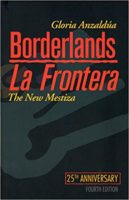
Borderlands/La Frontera: The New Mestiza by Gloria Anzaldúa
It’s hard to overstate the influence of queer Chicana literary scholar Gloria Anzaldúa. Before her death in 2004, the Rio Grande Valley native pushed the boundaries of feminism and social justice activism, powerfully articulating what it means to be from the border. Her most famous book, Borderlands/La Frontera, blends prose and poetry, Spanish and English, literary theory and memoir into a true tour de force.
Tell Me How it Ends: An Essay in Forty Questions by Valeria Luiselli
Our review of this 2017 extended essay dubbed it “the first must-read book of the Trump era.” Loosely based on the author’s experiences as a volunteer interpreter in a New York City immigration court, Tell Me How it Ends stares unflinchingly at the cruelty of the U.S. immigration system.
Homelands: Four Friends, Two Countries, and the Fate of the Great Mexican-American Migration by Alfredo Corchado
A longtime reporter for the Dallas Morning News, Corchado tells a riveting tale that’s part memoir, part history. He shares his own immigration story and those of three close friends along with a sharp analysis of the geopolitics of immigration, from the bracero work program of the 1940s and ’50s to the challenges facing Mexico today.
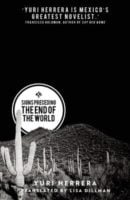
Signs Preceding the End of the World by Yuri Herrera
Signs Preceding the End of the World is a short and stark 128 pages. The otherworldly novel, the first of Herrera’s six books to be translated into English, tells the story of a woman named Makina, who works as a switchboard operator in Mexico before leaving to search for her missing brother in the United States. The Rumpus called it “haunting like a dream.”
Everyone Knows You Go Home by Natalia Sylvester
Sylvester’s absorbing novel starts with a couple named Martin and Isabel, who are visited on their wedding day by the spirit of the groom’s dead father. Over the years, this spirit returns to share family secrets as Martin and Isabel build their own lives while caring for an undocumented nephew. It’s a wide-ranging family saga that explores trauma, joy, and redemption.
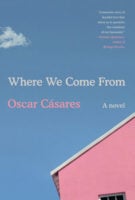
Where We Come From by Oscar Cásares
Set in Cásares’ native Brownsville, this book uses an unlikely friendship between two Chicano boys—one a privileged kid from the Houston suburbs, the other a migrant trapped in a stash house–to explore themes of class and identity. Observer reviewer Anis Shivani wrote, “Where We Come From shows how ‘family unification,’ the supposed foundation of our immigration policy, has become little more than lip service.”
Unaccompanied by Javier Zamora
Javier Zamora was just 9 years old when he traveled alone from El Salvador to the United States to reunite with his parents, who had already fled violence. He’s now a poet living in New York City. The poems in Unaccompanied are based on his harrowing journey here, but they also interrogate the United States’ role in funding and supporting the Salvadoran Civil War.
The Gringo Champion by Aura Xilonen
This novel’s protagonist is Liborio, an undocumented young man from Mexico who gets a job at a bookstore and eventually finds success as a boxer. But the plot is secondary to Xilonen’s inventive use of language and form; one reviewer described her unusual style as “a mixture of vernacular words from different Mexican regions and Chicano Spanglish, peppered with words and expressions from popular genres of literatures from the 16th and 17th century.”

Virgin by Analicia Sotelo
Sotelo, who grew up in San Antonio and Laredo and now lives in Houston, explores what it means to be a young, urban Latinx woman in this funny and incisive book of poems. “In her world, Latinos can name-check French social theorists and allude to Greek mythology, making themselves into Ariadne but still finding themselves lost in a labyrinth,” wrote reviewer Aaron Sanchez.
So Far From God by Ana Castillo
This landmark coming-of-age story, published in 1993, focuses on a Chicano family in the small town of Tome, New Mexico. With a touch of magical realism and a narrative structure that jumps back and forth across time, the book tells the stories of four sisters who grow up to meet wildly different ends.
The Devil’s Highway by Luis Alberto Urrea
As timely today as when it was first published 16 years ago, The Devil’s Highway recounts the true story of 26 Mexican men whose dangerous journey to the United States passed through an especially inhospitable stretch of the Arizona desert. Only 12 of them survived. With compassion for the men, the smugglers who led them into danger, and the Border Patrol agents who found the survivors, Urrea tells the story with a “lyrical, passionately political voice,” wrote reviewer Cameron Scott.
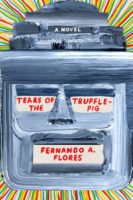
Tears of the Trufflepig by Fernando Flores
Border policy has become so inhumane, so unbelievable, that depicting it through the genre of science fiction makes a lot of sense. Flores’ weird, wonderful dystopian vision imagines a near-future South Texas overrun with cartels and bioengineered animals, including the titular green trufflepig. “Flores’ observations about the insatiable greed of the ruling class and the cruelty inherent in a system that prizes wealth above all else” feel more like fact than fantasy, wrote reviewer Michael Schaub.
I Am Not Your Perfect Mexican Daughter by Erika L. Sánchez
Fifteen-year-old Julia Reyes struggles to live up to her family’s—and her own—unreasonable expectations in the wake of her sister’s death. She dreams of moving to New York and becoming a writer, but her parents want her to stay home in Chicago. Smart, snarky, and struggling with depression, Julia is a complex character and a rare, nuanced literary portrait of a Chicana woman living with mental health issues.
Bang by Daniel Peña
Environmental justice, cartel violence, and the abuses endured by farmworkers are among the big questions that Peña addresses in his page-turning debut novel. Reviewer Juan Palomo compared the book—which tells the story of one South Texas family trying to stay together—to a boxer: “Lean and compact, it is packed with energy, ready to land blow after punch after jab on any reader who dares to underestimate it.”
The Boy Kings of Texas by Domingo Martinez
The Boy Kings of Texas, a finalist for the National Book Award, is a gritty memoir that details the author’s childhood in Brownsville. Reflecting on the culture of machismo and the joys and miseries of life in South Texas, Martinez never loses his sense of humor. Reviewer Roberto Ontiveros called it “a spirited confession in the tradition of smart, self-deprecating comedies.”
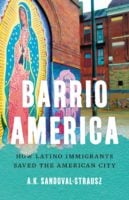
Barrio America by A. K. Sandoval-Strausz
Sandoval-Strausz draws on years of research to show how immigrants have revitalized American cities in Barrio America. The historian hones in on two neighborhoods that were transformed by Latinx immigration: Oak Cliff in Dallas and South Lawndale in Chicago. In both communities, migrants opened businesses, built new housing, and created jobs—yet they struggled to gain political power. “As the country grapples with a resurgence of anti-immigrant hatred, this fascinating history couldn’t be more timely,” wrote reviewer Anis Shivani.
All the Agents and Saints by Stephanie Elizondo Griest
A Corpus Christi native and globetrotting travel writer, Griest draws intriguing parallels and contrasts between the United States’ southern and northern borders. This work of creative nonfiction proves she can strike up a conversation with, and convey the humanity of, people of all backgrounds: “activists, artists, saints, bail bondswomen who moonlight as French restaurateurs, refinery workers and young men who sell weed from the back room of a taco shop.”
Correction: This story originally stated that the author of Tears of the Trufflepig was Francisco Flores. The author is Fernando Flores. The Observer regrets the error.
READ MORE:
-
A Solitary Condition: Texas has banished hundreds of prisoners to more than a decade of solitary confinement, an extreme form of a controversial punishment likened to torture. Many of these prisoners aren’t sure how—or, in some cases, if—they will ever get out.
-
In Texas, Thousands of Kids Lose Medicaid Coverage Each Month: Texas has the most uninsured kids in the nation. But state lawmakers have made it especially difficult for kids to stay on Medicaid.
-
ICE Quietly Lowers (Already Low) Standards at Some Immigrant Detention Facilities: The changes—which affect 18 facilities in Texas—include giving guards more leeway to put migrants in solitary confinement, as well as no longer requiring outdoor recreation areas.







